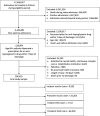The Association Between Insulin Initiation and Adverse Outcomes After Hospital Discharge in Older Adults: a Population-Based Cohort Study
- PMID: 30756304
- PMCID: PMC6445910
- DOI: 10.1007/s11606-019-04849-3
The Association Between Insulin Initiation and Adverse Outcomes After Hospital Discharge in Older Adults: a Population-Based Cohort Study
Abstract
Background: Starting insulin therapy in hospitalized patients may be associated with an increase in serious adverse events after discharge.
Objective: Determine whether post-discharge risks of death and rehospitalization are higher for older hospitalized patients prescribed new insulin therapy compared with oral hypoglycemic agents (OHAs).
Design: Retrospective population-based cohort study including hospital admissions in Ontario, Canada, between April 1, 2004, and Nov 30, 2013.
Patients: Persons aged 66 and over discharged after a hospitalization and dispensed a prescription for insulin and/or an OHA within 7 days of discharge. We included 104,525 individuals, subcategorized into four mutually exclusive exposure groups based on anti-hyperglycemic drug use in the 7 days post-discharge and the 365 days prior to the index admission.
Main measures: Prescriptions at discharge were categorized as new insulin (no insulin before admission), prevalent insulin (prescribed insulin before admission), new OHA(s) (no OHA or insulin before admission), and prevalent OHA (prescribed OHA only before admission) as the referent category. The primary and secondary outcomes were 30-day deaths and emergency department (ED) visits or readmissions respectively.
Key results: Of 104,525 patients, 9.2% were initiated on insulin, 4.1% died, and 26.2% had an ED visit or readmission within 30 days of discharge. Deaths occurred in 7.14% of new insulin users, 4.86% of prevalent insulin users, 3.25% of new OHA users, and 3.45% of prevalent OHA users. After adjustment for covariates, new insulin users had a significantly higher risk of death (adjusted hazard ratio (aHR) 1.59, 95% confidence interval (CI) 1.46 to 1.74) and ED visit/readmissions (aHR 1.17, 95% CI 1.12 to 1.22) than prevalent OHA users.
Conclusions: Initiation of insulin therapy in older hospitalized patients is associated with a higher risk of death and ED visits/readmissions after discharge, highlighting a need for better transitional care of insulin-treated patients.
Keywords: care transitions; diabetes; health services research.
Conflict of interest statement
The authors declare that they do not have a conflict of interest.
Figures


Similar articles
-
Antibiotic prescribing upon discharge from the hospital to long-term care facilities: Implications for antimicrobial stewardship requirements in post-acute settings.Infect Control Hosp Epidemiol. 2019 Jan;40(1):18-23. doi: 10.1017/ice.2018.288. Epub 2018 Nov 9. Infect Control Hosp Epidemiol. 2019. PMID: 30409235
-
Use of hospital-based acute care among patients recently discharged from the hospital.JAMA. 2013 Jan 23;309(4):364-71. doi: 10.1001/jama.2012.216219. JAMA. 2013. PMID: 23340638 Free PMC article.
-
Community pharmacy medication review, death and re-admission after hospital discharge: a propensity score-matched cohort study.BMJ Qual Saf. 2020 Jan;29(1):41-51. doi: 10.1136/bmjqs-2019-009545. Epub 2019 Aug 8. BMJ Qual Saf. 2020. PMID: 31395749
-
Postdischarge adverse events for 1-day hospital admissions in older adults admitted from the emergency department.Ann Emerg Med. 2010 Sep;56(3):253-7. doi: 10.1016/j.annemergmed.2010.01.031. Epub 2010 Feb 26. Ann Emerg Med. 2010. PMID: 20189266
-
Effect of Early Follow-Up After Hospital Discharge on Outcomes in Patients With Heart Failure or Chronic Obstructive Pulmonary Disease: A Systematic Review.Ont Health Technol Assess Ser. 2017 May 25;17(8):1-37. eCollection 2017. Ont Health Technol Assess Ser. 2017. PMID: 28638496 Free PMC article. Review.
Cited by
-
Associations Between Implementation of the Caregiver Advise Record Enable (CARE) Act and Health Service Utilization for Older Adults with Diabetes: Retrospective Observational Study.JMIR Aging. 2022 Jun 21;5(2):e32790. doi: 10.2196/32790. JMIR Aging. 2022. PMID: 35727611 Free PMC article.
-
Intensification of Diabetes Medications at Hospital Discharge and Clinical Outcomes in Older Adults in the Veterans Administration Health System.JAMA Netw Open. 2021 Oct 1;4(10):e2128998. doi: 10.1001/jamanetworkopen.2021.28998. JAMA Netw Open. 2021. PMID: 34673963 Free PMC article.
-
Developing a Diabetes Discharge Order Set for Patients With Diabetes on Insulin.J Diabetes Sci Technol. 2024 May;18(3):570-576. doi: 10.1177/19322968241239621. Epub 2024 Mar 28. J Diabetes Sci Technol. 2024. PMID: 38545894
-
Patterns and predictors of antihyperglycemic intensification at hospital discharge for type 2 diabetic patients not on home insulin.J Clin Transl Endocrinol. 2020 Feb 19;20:100220. doi: 10.1016/j.jcte.2020.100220. eCollection 2020 Jun. J Clin Transl Endocrinol. 2020. PMID: 32140422 Free PMC article.
-
Predictors of 30-day unplanned hospital readmission among adult patients with diabetes mellitus: a systematic review with meta-analysis.BMJ Open Diabetes Res Care. 2020 Aug;8(1):e001227. doi: 10.1136/bmjdrc-2020-001227. BMJ Open Diabetes Res Care. 2020. PMID: 32784248 Free PMC article. Review.
References
-
- Practices IfSM. ISMP List of High-Alert Medications in Acute Care Settings; https://www.ismp.org/sites/default/files/attachments/2018-10/highAlert20... Accessed Nov 24, 2018
-
- Ritsinger V, Malmberg K, Martensson A, Ryden L, Wedel H, Norhammar A. Intensified insulin-based glycaemic control after myocardial infarction: mortality during 20 year follow-up of the randomised Diabetes Mellitus Insulin Glucose Infusion in Acute Myocardial Infarction (DIGAMI 1) trial. Lancet Diabetes Endocrinol. 2014;2(8):627–633. doi: 10.1016/S2213-8587(14)70088-9. - DOI - PubMed
Publication types
MeSH terms
Substances
Grants and funding
LinkOut - more resources
Full Text Sources
Medical
Miscellaneous

